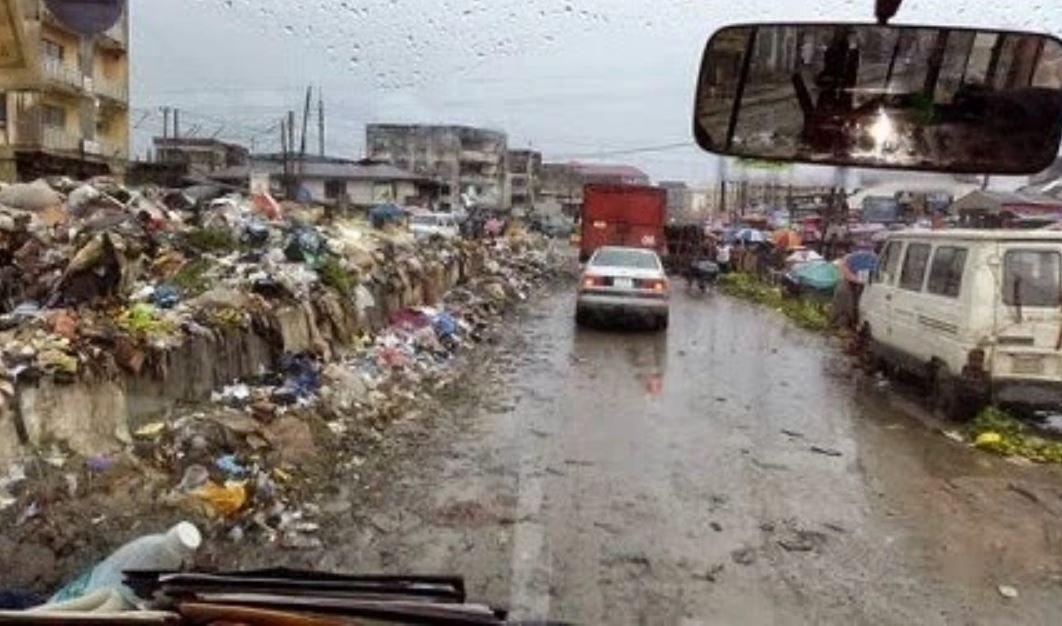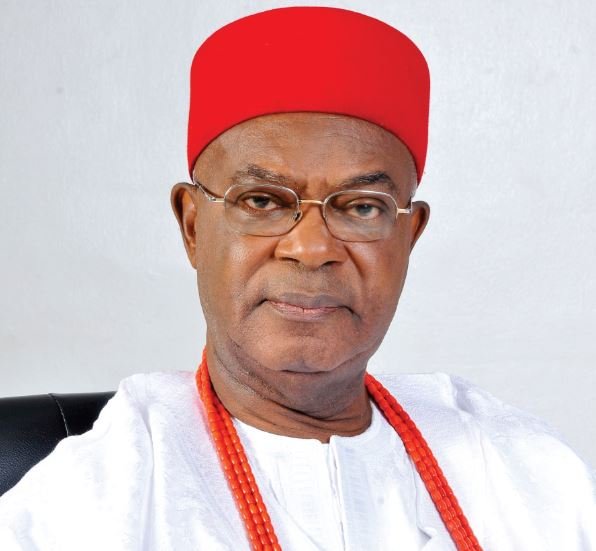
Top 10 Dirtiest States In Nigeria (2025)
This guide provides a list of the top 10 dirtiest states In Nigeria, with a comprehensive assessment of their environmental cleanliness and sanitation:
READ ALSO: Top 10 Cleanest States In Nigeria
Rank | State | Capital | Population (Approx.) |
|---|---|---|---|
1 | Abia | Umuahia | 3.7 million |
2 | Lagos | Ikeja | 14.8 million |
3 | Kogi | Lokoja | 3.5 million |
4 | Anambra | Awka | 4.2 million |
5 | Kano | Kano City | 9.4 million |
6 | Osun | Osogbo | 4.5 million |
7 | Nassarawa | Lafia | 2.5 million |
8 | Zamfara | Gusau | 4.0 million |
9 | Yobe | Damaturu | 2.5 million |
10 | Ogun | Abeokuta | 4.7 million |
1. Abia State
Abia State faces serious problems with waste management. The city of Aba is especially known for being dirty due to poor waste disposal systems.
Rapid urbanization and population growth have made it difficult for the Abia State Environmental Protection Agency (ASEPA) to manage the growing amount of waste.
The situation worsened when ASEPA staff went on strike over unpaid wages, causing piles of garbage to block gutters and spread bad smells. Illegal dumping in public spaces has become more common, which has created health hazards for residents.
However, the government has taken steps to partner with local companies to improve waste collection, but residents still often ignore proper disposal rules.
A state of emergency has been declared to address the issue, with the government pushing for better policies and encouraging communities to participate in cleaning efforts. While these actions are a start, waste management in Abia remains a big challenge.
2. Lagos State
Lagos, Nigeria’s most populated city also faces immense waste management issues due to rapid urbanization. The Lagos State Waste Management Authority (LAWMA) is responsible for keeping the city clean, but the volume of waste overwhelms the system.
Many parts of Lagos experience irregular garbage collection, leading to dirty streets and unsightly dumps. The informal sector also plays a part in waste collection, but it is not well organized, which has made the situation worse.
Many Lagos residents lack awareness about proper waste disposal and engage in illegal dumping because there aren’t enough proper facilities.
Although there are new recycling initiatives and efforts to promote cleaner practices, enforcing these rules is difficult.
Pollution continues to grow, and the government must invest in modern infrastructure and encourage residents to practice responsible waste disposal to make Lagos cleaner.
READ ALSO: List Of Freedom Fighters In Nigeria
3. Kogi State
Kogi State is considered one of Nigeria’s dirtiest states due to poor planning and infrastructure for waste management.
The population growth has caused a rise in waste generation, and local authorities struggle to keep up. Many communities don’t have access to organized garbage collection, which has practically led to littering and illegal dumping in open spaces.
The Kogi State Environmental Protection Agency (KSEPA) is responsible for managing waste, but it lacks the resources and public awareness to handle the problem effectively.
As a result, residents often throw waste by the roadside, creating dirty environments that threaten public health. While the government has tried to raise awareness through community clean-up programs, these efforts are short-lived because of limited support and resources.
Kogi needs more investments in waste management systems and stronger community involvement to solve these sanitation issues and ensure a cleaner environment for its residents.
4. Anambra State
Anambra State, home to about 4.2 million people, has disturbing waste management problems, particularly in its urban areas like Onitsha and Awka.
The state’s fast economic growth has led to an increase in waste production, but waste management systems have not improved to keep pace.
The Anambra State Waste Management Authority (ASWAMA) is responsible for overseeing sanitation, but a lack of enforcement of existing laws allows littering and illegal dumping to continue.
Residents don’t follow proper waste disposal methods due to limited access to collection services or disposal sites, resulting in illegal dumps scattered across neighborhoods.
However, community clean-up campaigns have been launched to encourage cleanliness, but these initiatives often fall short because they are not properly funded and there is limited public awareness.
To make Anambra cleaner, the government needs to enforce regulations strictly, invest in better infrastructure, and educate the public about the importance of proper waste disposal.
READ ALSO: List Of All Chairmen Of ICPC In Nigeria (2000-Present)
5. Kano State
Kano, one of Nigeria’s largest cities with an estimated population of 9.4 million, faces major challenges in managing solid waste. This is mainly due to a lack of regulations, especially for industrial pollution.
As a key commercial hub, Kano produces large amounts of waste every day, but the existing systems are not enough to handle it.
Factories and industries in the city operate without proper waste disposal systems, which has contributed to both land and air pollution. Residents living near these industries often suffer from respiratory issues because of the polluted air.
However, the Kano State government has tried to promote public awareness about proper waste management, but these efforts are limited. The government needs to invest more in modern waste management technologies and infrastructure.
Additionally, collaboration between industries and communities is important to tackle Kano’s growing environmental problems.
READ ALSO: The Meaning Of SON in Nigeria And Their Functions
6. Osun State
Osun State faces major environmental challenges, mainly due to illegal gold mining activities. These mining operations have caused severe deforestation, soil erosion, and water pollution.
Chemicals like mercury and cyanide are used in the mining process, which contaminates local water bodies, including the sacred Osun River.
This river is an important water source for the people and holds cultural significance, being central to the Osun-Osogbo festival.
The pollution has led to serious health issues for residents, including kidney diseases linked to contaminated water. About 20 communities in Osun have been severely affected, with many people walking long distances to find safe drinking water.
Though the state government is aware of these challenges, efforts to regulate mining and enforce environmental protection laws remain weak.
Illegal mining continues, worsening the crisis. Addressing these issues requires strict regulations, enforcement, and community education on sustainable practices.
7. Nasarawa State
Nasarawa State is facing major problems with waste management as urbanization has led to an increase in solid waste, which the local authorities struggle to manage properly.
Communities do not have access to proper waste disposal facilities. The Nasarawa State Environmental Protection Agency (NASEPA) is in charge of managing waste, but it has limited funds and manpower.
This lack of resources forces many residents to dump their refuse in open spaces or on the sides of roads, creating unsightly environments and health risks.
Pests thrive in these areas, and water sources get polluted, which can cause further problems. However, community clean-up campaigns and public awareness programs have been introduced to educate people on proper waste disposal methods.
Yet, these efforts are not always sustainable because of weak support from local authorities. To solve the problem, the state needs to invest in better waste management systems and encourage community involvement to promote responsible waste disposal.
READ ALSO: What Is The Full Meaning Of NDLEA And Their Functions
8. Zamfara State
Zamfara State is suffering from environmental degradation caused by illegal gold mining activities. The state is rich in mineral resources, but the unregulated mining process is causing severe ecological damage.
Toxic substances like mercury are used in mining, which contaminates both the soil and water. This pollution has serious health effects on the communities.
The degradation also affects agriculture, as soil quality is worsened, and the loss of biodiversity harms local ecosystems.
Despite efforts by the state government to regulate mining, challenges like corruption and weak enforcement continue to plague the system.
Community awareness of the dangers of illegal mining is also low, which has made it difficult to promote sustainable practices. Zamfara must introduce stricter regulations and stronger enforcement to control illegal mining.
9. Yobe State
Yobe State struggles with waste management and environmental sanitation. The state lacks proper infrastructure for waste disposal, and many communities do not have access to organized refuse collection services.
As a result, people often dispose of their waste in open spaces or water bodies, creating health risks and polluting the environment.
While the Yobe State Environmental Protection Agency (YSEPA) is responsible for managing waste, it faces significant challenges, such as limited resources and lack of public awareness.
Residents are not educated on proper waste disposal methods, which leads to littering and illegal dumping. This, in turn, causes pollution that affects both human health and the local ecosystems.
However, efforts have been made to improve sanitation through community clean-up campaigns and educational programs.
To effectively address the waste management crisis, Yobe must invest in waste disposal infrastructure and ensure consistent community engagement in keeping the environment clean.
READ ALSO: Complete List Of Army Barracks In Nigeria
10. Ogun State
Ogun State is one of Nigeria’s major industrial hubs, however, the state faces serious environmental problems, particularly due to pollution from factories.
Many industries in Ogun fail to follow proper waste management practices, which has led to major air and water pollution.
Harmful emissions from these factories have caused health problems, such as respiratory issues, for residents living nearby.
Although the Ogun State Ministry of Environment has set up programs to regulate industrial waste and promote sustainable practices, enforcement is still a challenge.
Factories often neglect environmental laws, and the government struggles with limited resources to enforce regulations.
To solve these problems, Ogun State needs stronger regulatory frameworks, better enforcement, and more collaboration between industries and local communities.



Those are too funy